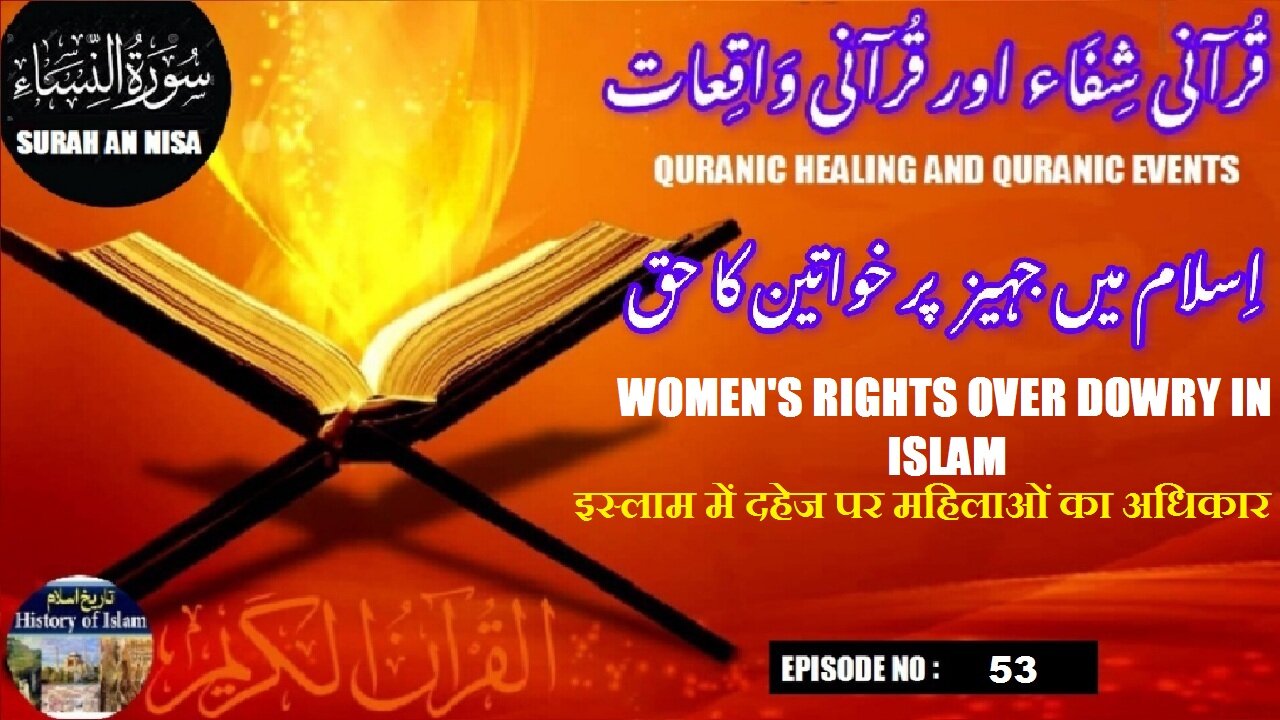Premium Only Content

Women's rights over dowry in Islam | दहेज पर महिलाओं का अधिकार |اسلام میں جہیز پر خواتین کے حقوق
@islamichistory813 #right #of #women #to #dowry #in #islam #healing #and #events #from #the #quran #historical #stories #and #events #quranicstories #selfhealing #success #stories #striking #events #in #history #quranstories #calm #quran #storiesfromthequran #religious #creation #stories #trending #quran #short #historical #loves #historical #heroes #what #is #true #strength #recitation #for #babies #islamic #healing
The Right of Women to Dowry in Islam; Quran’s Message of Justice (4:4)
Assalamu Alaikum, wa Rahmatullahi wa Barakatuhu.
Brothers, sisters, friends and elders, we are presenting the 53th episode of the Islamic informative video based on healing and events from the Holy Quran, and in this episode we will describe, The Right of Women to Dowry in Islam; Quran’s Message of Justice (4:4)
Quranic Treatment of Women and Orphans: Give Women Their Dowries Willingly (Surah An-Nisa 4:4)
The Holy Qur’an serves as the foundational guide for justice, ethics, and morality in Islam. One of the areas where the Qur’an brought about revolutionary change—especially in the context of pre-Islamic Arabia—was the status and treatment of women and orphans. Among the verses that specifically affirm women’s rights and dignity is Surah An-Nisa (4:4), which states: **"And give the women \[upon marriage] their \[bridal] gifts graciously. But if they give up willingly to you anything of it, then take it in satisfaction and ease."** This commandment is not only a financial obligation but a clear statement about the value, autonomy, and respect Islam accords to women. The verse establishes the dowry (mahr) as a **mandatory right** for the woman in marriage and underscores that it must be given **willingly, graciously, and respectfully**, without pressure, deception, or delay.
Before the revelation of the Qur’an, women in many parts of the world were treated as property themselves, often bought, sold, or inherited without their consent. In pre-Islamic Arabia, it was common for men to seize the dowries of their wives or to withhold them altogether. Women were not considered rightful owners of wealth or property. Islam dismantled these unjust customs and firmly established that women have **full ownership of their dowries**, and that dowry is not a favor from the husband but a **divine obligation** he must fulfill as a sign of commitment, honor, and respect. Surah An-Nisa 4:4 places this responsibility at the center of the marital contract, making it a fundamental requirement rather than a cultural tradition.
The wording of the verse is also significant. The Qur’an says to **“give”** women their mahr, implying an active and deliberate transfer of wealth to the woman, not to her family or guardians. Moreover, the directive to give it **“graciously”** (nihlatan) means that it should be done with a good heart, not begrudgingly, and without making the woman feel as if she owes something in return. This spirit of generosity and honor uplifts the dignity of the woman and transforms the dowry from a mere financial transaction into a symbol of respect and goodwill.
Additionally, the second part of the verse—*“but if they, of their own goodwill, remit any part of it to you”*—is equally important. It highlights the woman’s autonomy over her dowry. Once it is given to her, it becomes **her property alone**, and she is free to do with it as she pleases. If she chooses, out of her own free will, to gift any part of it back to her husband, that is her choice—but there should be no coercion or manipulation. The verse clearly safeguards women from being forced to relinquish their financial rights, emphasizing **voluntary consent** as a key aspect of any transaction involving her wealth.
This principle not only upholds women’s **economic independence** but also instills a culture of fairness, trust, and transparency in marital relationships. Islam teaches that marriages should be built on mutual respect, not financial exploitation or imbalance. The dowry, therefore, is not a "price" for the woman, but a **gift of honor**, and its rightful delivery is an act of obedience to Allah’s command.
Furthermore, this verse ties into the broader Quranic vision of social justice. Like the commands related to the fair treatment of orphans, the instruction to give dowries graciously promotes a society where **rights are protected**, and **trusts are honored**. Islam consistently condemns the unjust withholding of wealth, especially when it involves the rights of vulnerable individuals, such as women, children, or orphans. In both cases, the Qur’an upholds not just legal rights, but **moral responsibility**, reminding believers that Allah is ever-watchful over their actions.
This Quranic command also has **legal implications** in Islamic jurisprudence. In Islamic law, a marriage is not considered complete unless the dowry is agreed upon. While the exact amount may vary, the principle that it belongs solely to the woman remains consistent across schools of thought. The failure to provide the mahr is grounds for invalidating or even annulling a marriage. This legal framework serves to ensure that a woman’s financial rights are not subject to neglect or abuse.
In today’s world, this verse continues to offer relevant and powerful guidance. In societies where women’s rights are still compromised, or where cultural traditions overshadow Islamic principles, Surah An-Nisa (4:4) stands as a clear directive from Allah to **respect, honor, and empower women** through the rightful fulfillment of their financial rights. It reminds both men and women that marriage in Islam is not a tool of control or superiority, but a relationship founded upon mutual respect, justice, and mercy.
In conclusion, Surah An-Nisa (4:4) is a shining example of the Qur’an’s commitment to justice for women. By commanding that women be given their dowries willingly and without hesitation, the Qur’an elevates the status of women as rightful owners of property and full participants in financial and social life. This command not only protects women’s rights but fosters a culture of trust, respect, and fairness—principles that lie at the very heart of Islam.
With this, we ask for your permission until tomorrow and pray to Allah Almighty to grant us the ability to act on the Quran and Hadith, Amen
Allah Hafiz
============================
-
 10:29
10:29
ISLAMIC HISTORY
1 hour agoHow does Surah Yunus describe the Quran سورہ یونس قرآن کو کیسے بیان کرتی ہے؟
1 -
 5:08:55
5:08:55
Dr Disrespect
21 hours ago🔴LIVE - DR DISRESPECT - BABY STEPS - THE VERY VERY LAST CHAPTER
142K17 -
 10:28
10:28
BlabberingCollector
17 hours agoAsk Blabs, Episode 5 | Answering Your Wizarding World Related Questions
19K1 -
 18:09
18:09
Forrest Galante
5 days agoI Survived 24 Hours In The World's Deadliest Jungle
202K33 -
 LIVE
LIVE
Lofi Girl
2 years agoSynthwave Radio 🌌 - beats to chill/game to
273 watching -
 2:15:09
2:15:09
Badlands Media
21 hours agoOnlyLands Ep. 27: Power Hour Hangover, Trump’s Wartime Shift, and Portland in Flames
131K34 -
 22:21
22:21
DeVory Darkins
11 hours ago $21.73 earnedRioters attack Portland ICE Facility as Democrats make shocking admission
35.9K146 -
 2:06:06
2:06:06
TimcastIRL
13 hours agoTrump DOJ Announces INTERVENTION In Portland Over Nick Sortor Arrest | Timcast IRL
255K440 -
 6:53:58
6:53:58
SpartakusLIVE
15 hours ago#1 All-American HERO with LUSCIOUS hair and AVERAGE forehead brings Friday Night HYPE
73.6K7 -
 3:06:43
3:06:43
Laura Loomer
13 hours agoEP147: Islamic Terror EXPLODES In The West After UK Synagogue Attack
57.4K49
